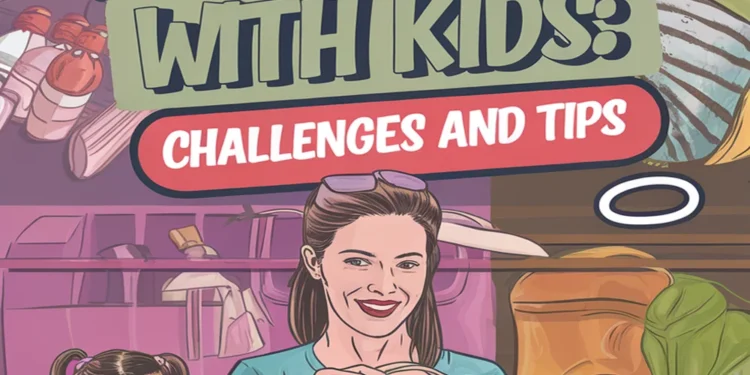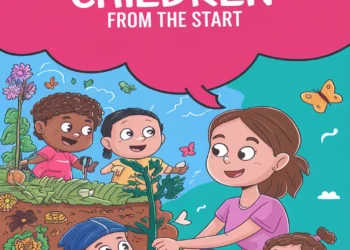Living a zero-waste lifestyle with kids can spark exciting changes in your family routine. Involve your kids in eco-friendly activities, like sorting recyclables and packing reusable lunches. Don’t shy away from challenges; instead, turn them into fun learning moments. Set achievable goals together, and celebrate small victories. Remember, it’s a journey that bonds your family while teaching valuable lessons. Discover more tips and ideas to make this adventure enjoyable and sustainable for everyone.
Understanding the Zero-Waste Concept
Understanding the zero-waste concept is essential for anyone looking to reduce their environmental impact, especially when you have kids. This principle aims to eliminate waste by rethinking how you consume and dispose of items. Start by evaluating what you use daily; opt for reusable products like cloth napkins, water bottles, and shopping bags. Encourage your family to repair instead of replace, embracing a culture of resourcefulness. Aim to compost organic waste and recycle responsibly to minimize landfill contributions. Make it a family challenge to identify areas where you can cut back on excess—perhaps reducing packaging or choosing bulk items. By integrating zero-waste practices into your lifestyle, you’ll create lasting habits that protect the planet for future generations.
Recommended Items
Discover our top picks for family essentials that make zero waste living easier and more enjoyable—dive in!
Products
The Importance of Involving Kids in Sustainability
Incorporating kids into sustainability efforts makes the journey more enjoyable and impactful. When you engage your children in eco-friendly activities, you’re not just teaching them responsibility; you’re nurturing their love for the planet. This hands-on approach empowers them to take ownership of their actions and become aware of their environmental footprint. Encourage them to participate in recycling, gardening, or even DIY projects, allowing their creativity to thrive. By involving them, you’re instilling valuable lessons that’ll last a lifetime. Plus, sharing these experiences can strengthen your family bond as you work towards a common goal. Watching them embrace sustainability can be as inspiring for you as it is for them, creating a shared passion for a greener future.
Step-by-Step Guide to ZeroWaste with Kids
Common Challenges Faced by Families
While embracing a zero-waste lifestyle with kids is rewarding, families often encounter a few common challenges. First, kids can be resistant to change, clinging to their favorite products and routines. It’s also tough to find zero-waste alternatives that suit your family’s preferences and lifestyle. As a parent, you may struggle with time constraints, making it difficult to research and implement sustainable practices. Additionally, budget limitations can make eco-friendly choices feel out of reach. Don’t forget the social pressures; outings with friends might lead to temptations for single-use items. Finally, balancing education and implementation can overwhelm you, especially with kids’ varying interests and attention spans. Embrace these challenges as opportunities for growth and learning together.
Setting Realistic Goals for Your Family
Faced with challenges, it’s important to set realistic goals for your family’s zero-waste journey. Start by focusing on a few simple changes that everyone can embrace. You don’t need to overhaul your lifestyle overnight.
| Goal | Action Item | Timeline |
|---|---|---|
| Reduce plastic use | Switch to reusable bags | 1 month |
| Compost food scraps | Set up a compost bin | 2 months |
| Buy in bulk | Visit local bulk store | 3 months |
| DIY cleaning products | Make simple recipes | 1 month |
Celebrate small wins and adjust goals as needed. This approach fosters teamwork and allows your kids to see that even small steps matter in creating a sustainable future.
Eco-Friendly School Lunch Ideas
Packing eco-friendly school lunches not only reduces waste but also sets a great example for your kids. Start with reusable containers or beeswax wraps instead of plastic bags. Choose whole foods like fruits, vegetables, and nuts that don’t need packaging. Make sandwiches using whole-grain bread, and consider adding homemade spreads or hummus to enhance flavor while avoiding single-use items. Opt for a thermos to keep warm meals or soups, eliminating the need for disposable containers. Encourage your kids to bring a reusable water bottle instead of juice boxes. Involve them in the process—let them pick favorites and help with packing. By making these choices, you’ll cultivate their eco-awareness and teach them to love sustainable living.
Sustainable Birthday Party Tips
When planning a birthday party for your child, incorporating sustainable practices can make the celebration even more memorable. Here are some practical tips to reduce waste while keeping the fun alive:
| Tip | Action | Benefit |
|---|---|---|
| Choose E-invites | Use digital invitations instead | Saves paper and reduces waste |
| Decorate Naturally | Use flowers or leaves for decor | Biodegradable and beautiful |
| Prepare Homemade Treats | Bake and package snacks at home | Limits single-use plastic |
| Zero-Waste Games | Opt for outdoor or DIY activities | Promotes creativity and fun |
| Favor Nature Gifts | Give plants or seeds instead of toys | Nurtures a love for nature |
Shopping Strategies for Zero-Waste Families
Embrace a mindful approach to shopping by adopting strategies that align with your zero-waste lifestyle. First, create a shopping list to avoid impulse buys and reduce waste. Choose local farmers’ markets and bulk stores where you can bring your containers and fill them with fresh produce or dry goods. Opt for products with minimal or zero packaging, and consider buying secondhand items whenever possible. Involve your kids in the process; teach them about the importance of reducing waste and the joy of finding treasures in thrift shops. Finally, plan meals ahead to guarantee you buy only what you need. With these strategies, you’ll nurture a sustainable mindset in your family while minimizing your environmental impact.
Reusable Household Items for Everyday Use
Incorporating reusable household items into your daily routine can significantly reduce waste and promote sustainability. By making simple swaps, you can create a more eco-friendly home for your family. Here are four items you should consider:
- Stainless Steel Water Bottles – Keep everyone hydrated without single-use plastic.
- Beeswax Wraps – Replace plastic wrap for food storage with these biodegradable alternatives.
- Reusable Shopping Bags – Always carry these while shopping to avoid plastic bags.
- Cloth Napkins – Ditch paper towels for washable cloth options at mealtime.
Creative Ways to Reduce Food Waste
Although it may seem challenging, reducing food waste can be both practical and rewarding. Here are some creative ways to make it happen with your family:
| Tip | Example |
|---|---|
| Meal Planning | Plan your week’s meals to use similar ingredients. |
| Scraps to Stock | Save vegetable scraps for homemade broth. |
| Leftovers Love | Get creative with leftovers, turning them into new meals. |
| Creative Uses for Fruit | Use overripe bananas in smoothies or baked goods. |
Engaging kids in these activities not only minimizes waste but also teaches them valuable lessons about sustainability. You’ll find joy in cooking together and crafting new recipes, making waste reduction an exciting family adventure.
Eco-Conscious Activities for Family Fun
When you seek out eco-conscious activities for family fun, you not only strengthen your bonds but also instill a sense of environmental responsibility in your kids. Here are some engaging ideas to get you started:
- Nature Scavenger Hunt: Explore local parks and identify plants, insects, and rocks.
- DIY Bird Feeders: Use repurposed materials to create feeders, teaching kids about wildlife.
- Gardening Together: Start a small vegetable or herb garden to emphasize sustainability.
- Zero-Waste Crafts: Gather scraps and old items for creative projects, making art from waste.
These activities promote a love for nature while making memories together. By having fun, you’re teaching your kids that caring for the planet can be enjoyable!
Teaching Kids About Recycling and Composting
To foster a deeper understanding of recycling and composting, engage your kids with hands-on activities that make the concepts tangible. Start by creating a simple recycling station at home. Label bins for paper, plastic, and metal, and involve your kids in sorting. Turn composting into a fun project by establishing a small compost pile or bin and letting them add kitchen scraps. Explain how their efforts can help the planet.
Use storytelling or animations to illustrate the recycling process and the life cycle of compost. Encourage them to ask questions and share what they learn. Regularly discuss the impact of their actions. By making these activities enjoyable, you’ll inspire a sense of responsibility and eco-consciousness that sticks with them.
Building a Supportive Community
Building a supportive community around a zero-waste lifestyle not only enhances your family’s efforts but also creates a network of like-minded individuals. When you connect with others, you can share resources, ideas, and motivation to keep everyone on track. Here are some ways to build that community:
- Join local zero-waste groups – Find meetups or online forums where you can share experiences and tips.
- Organize workshops – Host events where families can learn together about sustainable practices.
- Create a neighborhood swap – Encourage trading items instead of tossing them out.
- Celebrate together – Acknowledge collective achievements, fostering a sense of accomplishment and connection.
Together, you can inspire each other to embrace and expand your zero-waste journey!
Celebrating Small Wins on Your Journey
Celebrating small wins on your zero-waste journey brings immense joy and motivation to your family. Recognizing these achievements can create a positive atmosphere that fuels further efforts. Here are some examples to help you track and celebrate progress:
| Win | How to Celebrate | Impact on Family |
|---|---|---|
| Switched to reusable bags | Create fun bag designs | Engage kids in crafts |
| Made homemade snacks | Family cooking night | Bonding over delicious treats |
| Reduced plastic use | Share experiences with friends | Inspire others in community |
| Started composting | Create a backyard adventure | Explore nature together |
| Saved money with DIY | Have a family “spa day” | Enjoy quality time together |
These moments not only boost morale but also reinforce your commitment to a sustainable future!









